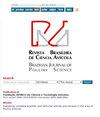双重降解葵花籽肽对肉仔鸡生长性能、营养物质消化率和健康状况的影响
IF 1.1
4区 农林科学
Q3 AGRICULTURE, DAIRY & ANIMAL SCIENCE
引用次数: 0
摘要
本文章由计算机程序翻译,如有差异,请以英文原文为准。
Effect of Sunflower Kernel Peptides Produced by Dual-Degradation on the Growth Performance, Nutrient Digestibility, and Health Status of Broilers
The purpose of this study was to investigate the effect of sunflower kernel peptides produced by enzymatic digestion, fermentation, or both on the growth performance, nutrient digestibility, and health status of broilers. Four diets contained 20% of sunflower kernel meal as its raw form (CON) or degraded by protease (ESM), Bacillus pumilus (FSM), or both (DSM). A total of 480 yellow broilers at one day old were randomly distributed to 4 groups with 6 replicates of 20 chicks each. The feeding trial lasted for 63 d. Results showed that peptide content was increased ( p <0.001) from 3.97% (CON) to 32.5% (ESM), 24.2% (FSM), and 39.1% (DSM). The three sunflower peptide groups improved ( p ≤0.001) feed intake and body weight gain. The peptide groups increased ( p ≤0.015) ileal apparent digestibility of dry matter, energy, crude protein, and amino acids (methionine, lysine, tryptophan, and threonine). Furthermore, the peptide groups improved ( p ≤0.029) the health status by increasing serum immunoglobulins (IgA, IgG) and glutathione peroxidase. Additionally, among the peptide groups, DSM showed more pronounced effects ( p <0.05) on these parameters than ESM or FSM. It is concluded that dual-degradation by enzymolysis and fermentation has a better improvement in the nutrition and application of sunflower kernel meal in broilers.
求助全文
通过发布文献求助,成功后即可免费获取论文全文。
去求助
来源期刊

Brazilian Journal of Poultry Science
农林科学-奶制品与动物科学
CiteScore
1.80
自引率
9.10%
发文量
60
审稿时长
>12 weeks
期刊介绍:
A Revista Brasileira de Ciência Avícola surgiu em 1999 a partir da necessidade que a comunidade científica possuía de um periódico para veiculação e publicação de seus trabalhos, com a publicação de três números anuais.
A Revista conta hoje com um corpo editorial altamente qualificado e com artigos científicos desenvolvidos pelos maiores especialistas da área, o que a cada dia atrai mais leitores em busca de inovação e respaldo técnico.
Devido à credibilidade que conquistou pelos esforços de sus autores, relatores e revisores, a Revista ganhou caráter de coleção, sendo consultada como fonte segura de estudo desenvolvidos na Avicultura.
A partir de 2003 – volume 5 -, a Revista passou a chamar-se Brazilian Journal of Poultry Science, e todos os trabalhos passaram a ser publicados em inglês. No mesmo ano subiu para quatro o número de revistas por volume, ampliando-se assim os trabalhos publicados anualmente.
 求助内容:
求助内容: 应助结果提醒方式:
应助结果提醒方式:


